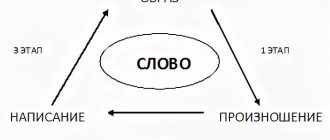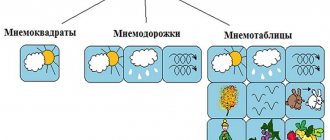Can't help your child learn a poem ? And all because you may be pressing the wrong strings, and pressing so hard that it becomes difficult for the child to remember even a couplet. Meanwhile, everything is so easy and simple! Reading the tips...
Magnificent Eight
Sometimes a child is frightened not by the poem itself, but by its size. In this case, we divide the poem into parts, into quatrains, and memorize each one in order. There are two quatrains in the first hour. Then the next two. Exactly two, not more!
Thus, the child will learn poetry more easily, since eight lines is a volume that is not difficult for the average student to remember. When he sees that two quatrains are quickly memorized, the fear of learning the entire verse will pass.
Full immersion
Well, now let's use our imagination. Bring your text to life. Help your child imagine what is happening, tell about the village in which a little boy lived, about how hard it was for his father to feed his large family, about the severe frost. When you visualize the text, the child will accept it more easily and will be imbued with emotions. And what evokes emotions is much easier to remember.
Associations
Difficulties often arise with individual words used by the poet and which have lost their relevance. And, as a rule, it is difficult for a child to remember them. He stumbles when he comes to a word, for example, “short fur coat,” which the “little man with a fingernail” was wearing. It seems that everything is clear that this is a short fur coat, but it is difficult for the child to remember the word.
Come up with any association for this word. Ask your child what first comes to his mind when he hears the word “short fur coat.” The child will tell you. Try to express the associations in one word. And your little schoolchild will mentally refer to this word while reciting the poem. And over time, he himself will learn to come up with associations, because they help to remember the rarest words of poets in our time.
Drawing a poem
You can also Quatrain after quatrain. And it is not at all necessary to create masterpieces of fine art. Schematic drawings will suffice. It’s better if they are funny, of course, if the content of the work allows this. First we draw, and then we tell the poem based on the pictures. In general, play illustrator. This method is good because visual memory is connected to the memorization process.
A book under the pillow
The most magical way! In the evening before going to bed, you need to read a poem, hide the book under your pillow and go to bed. And in the morning it suddenly turns out that the poem from the book migrated into your head overnight! To be honest, I did the same thing when I was in school.
It turns out that there is a completely scientific explanation for this magical method. I won't go into details. I will only say that the human brain is designed in such a way that it remembers very well what was written, read or heard before going to bed.
Dictaphone
Nowadays every phone has a built-in voice recorder. Make an audio recording of a poem read by your child. The main thing is that it be read with expression. And then, have the student turn on the recording and listen to it three times. So, you will connect auditory memory to the process, and significantly increase the child’s chances of remembering those lines that cannot be learned in any way. In addition, this method makes it possible to hear yourself from the outside and, if necessary, work on your speech, pronunciation and intonation.
Theater
Oh, this is our favorite family method for memorizing poetry! Each line of the work is not only read, but also shown. Either by the child himself or by all family members (if there are many characters). I am sure that my daughter will never forget the phrase “Father, do you hear, he is chopping…”. Since our dad showed it very picturesquely) Everyone laughed. So a verse assigned to your home can provide you with interesting family leisure time.
Cut stitches
And this is a way to consolidate a learned verse in memory, to transfer it from short-term memory to long-term memory. What long-term memory is is described in detail here. You need to print the poem on a piece of paper or just write it. The main thing is that the font is large. And then take and cut the verse into separate lines. Mix and invite the child to lay out the lines in the right order.
I really hope that the above 10 ways will help you and your child make sure that memorizing poems by heart is a creative, interesting, and sometimes also very fun process! The same as preparing for a retelling.
Recommendations for memory training
There are many methods and exercises for memory training in the world, almost all of them are effective. Let's look at the most popular of them, which have many positive reviews.
- During any mathematical calculation, you should put the calculator aside. By counting in your head or on paper and doing it regularly, a person increases your memory capacity significantly.
- Start your day by counting from 100 to 1. You need to count in this order and try to increase the speed every day.
- A fairly effective exercise is called “Cities in a Minute.” It's easy to do: in just one minute you need to name 60 cities, one city per second. You won’t be able to do this the first time, but by doing this task every day, you can notice positive results within a week.
- You can try learning new words. This technique will allow a person not only to train his memory, but also to learn a foreign language. Such exercises should be performed regularly, since just once the picture will not change, just like when training muscles. It is recommended to learn fifteen words a day and increase this barrier with each subsequent week.
- The simplest and most well-known exercise is considered to be the usual memorization of a poem. The important thing about this technique is its consistency, that is, you need to learn new poems systematically.
Sing poetry
Another way to learn a very long poem is to sing. No matter how strange it may sound at first glance, singing contributes to better memorization of large poems. Think about how many songs you know that you haven’t even tried to remember.
Check, maybe someone has already set the poem to music, as happened with the work of Tsvetaeva, Akhmatova, Polozkova. Or try it yourself by choosing your favorite melody or composing a new tune.
Instructions for quick learning
Among the homework assignments of every student in an educational institution in almost every humanities subject, the task is often set to learn poetry by heart. Then, of course, the question arises, how to easily and quickly learn a verse by heart? This question interests 90% of people. What’s most interesting is that almost all of these 90% initially find it impossible to study the verse in a short time. Why does this question arise? Yes, because at home you want to save time, relax longer, walk outside or on the computer, and in general, few people respect cramming. There is an effective technique that answers the question of how to quickly learn a verse during recess, before class, or in a hurry at home. Therefore, in this article we considered it necessary to show you, although complex methods, they are quite feasible, and most importantly, very effective.
General recommendations for working with poetry
- First, you need to read the verse repeatedly.
- Then try to understand in general what this verse is about.
- If the text of the verse and its logic are not clear to you, look for the general meaning of each line.
- And finally, do not forget that in each line of the poem you need to mark the semantic word
Sometimes it happens that there is very little time, and you need to remember a verse here and now. Therefore, we offer for your consideration
Special scheme
The scheme is 100% working, but its application requires some effort on your part:
First, let's read the first line of the poem. Then we try to repeat it several times. Please note that when first repeating a line of verse, we look at the text. Then we read again and repeat the passage of the poem, no longer looking at the text. Next, when you have memorized two lines, connect them. First, you can repeat the lines of the poem, looking at the text. Now we say the lines of the poem without relying on the text. We repeat this algorithm for all the poems, not forgetting to add each new learned line to the total volume of the verse each time. At the final stage, say the entire poem without looking at the text.
That is, it turns out that you will repeat the entire poem quite a few times, which will play a significant role in quickly learning the verse. When using this method, you will not feel particularly tired, dull or bored, because there is no monotony. Most likely, an analogy can even be drawn here with collecting scattered beads. Each line of the poem is like a lost bead. As soon as you repeated it and remembered it, it fell on the thread of your memory. And so on every next line. The result is a complete string of beads. Or a whole perfect poem. Do not forget that in the learning process itself it is best to use the method of associations. At the same time, mentally imagine the picture that is discussed in the poem. Something will remain in your head after this.
Online services
There are also online services for studying poetry. You can find them on the Internet. Or come up with a motive and try singing a few lines of the poem. This method is very effective when you have very little time at your disposal and the verse is quite simple. In just one minute, if you choose a good rhythm, you will be able to remember several elementary quatrains. Well, if there are words in the verse that cannot be memorized, write them down on a small piece of paper or on your hand and use this cheat sheet if necessary.
How much time does it really take?
This question probably also worries you. Is it even possible to do it in 5 minutes? Or is this just a figurative expression? In fact, everything will depend only on your memory. If you constantly train and improve, then memorizing poetry will be an easy task for you. It's important to find a way that really suits you. Choosing the right method can take a lot of time. But if it is found, the verse can be learned in a few minutes.
You can start learning at any time of the day, but in the evening, before going to bed, you must repeat the work. And even if it seems to you that there is complete chaos in your head and you have not been able to learn the verse, a surprise awaits you in the morning. Overnight, the information received will be structured and assimilated, and you will find that you have memorized almost all the lines.
How long it really takes to memorize a verse is also influenced by the work itself and its author. Some are remembered after the first reading, while others can be learned for a very long time. Usually, the question of how to learn Pushkin’s verse in 5 minutes practically does not arise, since the lines of this great poet are, as a rule, understandable and interesting. But questions are already arising with Lermontov’s works.
In general, each person has its own nuances. It is only important to remember that there are no incapable people. The brain can and should be trained, and then memorizing poetry will only bring you pleasure.
Source
Learn a poem in one day
Auditory, visual and motor memory develop differently in all people
In order to quickly learn a verse, it is important to use all the types of memory mentioned above at the same time
Action plan:
First, you need to carefully and thoughtfully read the poem out loud several times. The actions and pictures that are described in it need to be visualized as clearly and completely as possible before your eyes. Think about what you read, put the verse aside for a while and recite it a second time. Now you need to rewrite the text of the poem, but at the same time pronounce what you are writing. Then you should only work with the text that you yourself wrote by hand. The poem should be read in quatrains or complete semantic sentences if they are long. After reading, you need to repeat it, but the sheet with the text should be to the side. If it doesn’t come out right away, then read and repeat until the first quatrain is mastered. Now we proceed to the next stanza, and then repeat both at the same time. We work according to the above scheme, and when the third stanza is mastered, you need to repeat three stanzas together, and then learn the following paragraphs
Thus, when you add one memorized quatrain to the one you have learned, you will soon master the entire poem. Particular attention should be paid to the transitions between stanzas. Record the verse you need to memorize on a voice recorder and listen to it one paragraph at a time, repeating what you heard
Such an algorithm will be more effective than standard reading if you perceive information better by ear. There is no need to be a hero and try to memorize all the stanzas without interruption, this will not give the desired result. The memorization effect will occur then, then you take a break for 10-15 minutes after memorizing every two or three stanzas. When you repeat the memorized text several times, get distracted and do other things. Before going to bed, she recommends reciting the poem 2-4 times, this will help to put it in your memory for a long time. When you wake up, try reading a memorized poem without any prompting. Skip the lines you forgot, remember everything that remains in your memory. Now you need to take the written text, read it a couple of times and repeat it by heart.
Please note that the more often you learn the text by heart, the faster your memory will be trained. And new information will be remembered much faster
Advice! After studying the methods listed above and trying them on yourself, choose the one that suits you best and gives the desired result. By focusing on the chosen method, you will stimulate the memorization process.
What poems should you teach with your child?
The selection of works should be carried out taking into account the age of the children.
More often, the following poems for children to memorize are:
- When developing children aged 3-4 years, special attention should be paid to works that are replete with combinations of verbs and nouns. For example, these are poems by Agnia Barto “Ball”, “Truck” or “Bear”.
- With children aged 4-5 years, it is recommended to learn poetry with somewhat complicated text content. Such works may include elements of abstraction. Therefore, it is important to figure out how to easily learn the verse of Marshak S.Ya. “Mustache-striped” or Chukovsky K.I. "Fly Tsokotukha".
- For children 6-7 years of age, the meaning of the piece being memorized becomes more complex, and the volume increases. The works of K.I. Chukovsky meet these requirements. “Moidodyr”, Marshak S.Ya. "Baggage" and others.
To develop the memory of schoolchildren, they learn the poetry of P. Ershov, A.S. Pushkin, F. Tyutchev and other authors. However, there is a paradox here. It is easier to learn the works of those authors who have a natural syllable. At the same time, the brain is better developed by the poems of writers “alien” in their manner of presentation. It is believed that they perfectly reveal the potential of the brain.
That’s why, before you quickly learn a verse, you still need to choose the right piece. According to recent studies, the following works of Pushkin have a special influence on the intellectual abilities of high school students:
- poem "Count Nulin";
- work "Eugene Onegin".
How to quickly learn a verse by heart
There are many effective tips to speed up the memorization of works.
How to learn a verse quickly and easily by heart:
- Read the work out loud several times. You can even rewrite the verse or reprint it (this recommendation applies more to schoolchildren and adults).
- When pronouncing words, do it with expression. The intonation should be as if an exciting story is being told to the audience. To add emotionality to speeches, words are supplemented with facial expressions and gestures.
- When learning to read a poem, you need to read it out loud, not silently. This will help you better grasp the rhyme and remember the text in a short time.
How to learn a short verse quickly?
The simpler the syllable, the easier it is to do this. Still, there are a number of recommendations on how to learn a verse in 5 minutes.
When memorizing a short poem with your child, it is important to follow these tips:
- The adult himself must tell the child the work by heart.
- The teacher reads a line from the verse and gives it to the child to repeat. This happens until the end of the work.
- Next, the learned material is consolidated. At this stage, the adult reads the words of the first line aloud, leaving the last phrase unsaid. At this moment, the child needs to strain his brain to remember the word.
- At the next stage, the adult holds back two words, giving the baby the opportunity to remember them. Gradually the number of words increases. This continues until the baby begins to pronounce the entire piece himself.
How to quickly learn a large verse?
The instructions prepared by experts will be a huge help in this. It will be especially useful for high school students who often have to memorize long works.
How to learn a verse quickly:
Read the entire work aloud, trying to grasp the meaning of each stanza. Having put the book down, you need to try to retell the verse in your own words
At this stage, it is important to find out the meaning of unfamiliar phrases. You need to read the work again, dividing it into quatrains. Then they begin to memorize the poem one stanza at a time. You need to pronounce the work with expression
It is important to pause where punctuation marks occur. In addition, the intonation of the work must be correctly conveyed. To speed up memorization, you can rewrite the poem several times without making any abbreviations.
How can you quickly learn a poem in English?
The speed of memorizing a work is mainly influenced by the level of proficiency in a foreign language. This is quite logical, since the larger the vocabulary, the easier the meaning of what is read is perceived and the text is easier to remember.
How to quickly memorize a verse in English:
- It is necessary to read the work out loud and in order. At the same time, you need to imagine what is being said: landscapes, characters, emotions, and so on.
- When reading the verse a second time, the emphasis should be on the sound of the words (emphasis). This helps activate auditory memory.
- The work must be copied into a notebook and what has been written down must be spoken. Motor, visual and auditory memory are simultaneously involved here.
- The piece is recorded again. This time it is divided into parts that are easier to learn. You can make sketches and comments between the columns.
Why should children learn poetry?
Memorizing a piece is very useful for a child. It serves the following purposes:
- Develops memory.
It is worth noting that the ability to store and reproduce information can be compared to a balloon. The more it fills with air, the higher it flies into the sky. A similar process occurs with memory. It can “inflate” as it is filled with information. Poems by heart fill the memory. After such training, the brain literally flies and develops with renewed vigor. - Improves intelligence.
During learning, new neural connections are formed. Figuring out how to quickly and easily learn a verse is very important. Such memory training is equivalent in effectiveness to “vitamins” for the brain. Memorization activates mental abilities: attention, thinking, and so on. It has been scientifically proven that children who memorize poetry learn better than those who do not train their brains. - Teaches you to present yourself.
Poems learned by children or schoolchildren are pronounced in front of an audience: at a holiday or in front of the class. Such speeches help to cope with anxiety and place emphasis correctly. As practice shows, children who recite poetry in competitions become excellent speakers. - Promotes diversified development.
Often the works contain incomprehensible words, for example, “coachman” or “cabin.” When learning poetry by heart, schoolchildren don’t just mindlessly memorize everything, but try to figure it out. This also develops their vocabulary and instills in them a poetic taste.
So, how can you learn a poem by heart in 5 minutes?
First method: To quickly learn a poem by heart, you need to re-read it out loud two or three times. While reading, it is best to use association methods, imagining in your mind the picture that is described in the verse. After all, a poem is nothing more than the feelings and emotions experienced by the lyrical hero, as well as by the author himself.
Second method: The above method is very effective. It allows everyone to memorize a couple of pages of text within one hour. But if you still have a little time left, you can start learning the poem two days before the due date. On the 1st day, you should spend about half an hour memorizing before going to bed, and on the 2nd day, add the same amount of time to this time. As a result, you will know a verse memorized in this way from cover to cover.
Third method: To begin with, you should read the poem thoughtfully, without rushing anywhere, without setting the goal of immediately starting to learn it. You need to try to understand the meaning, subtext of the verse, and guess what the author wanted to say to the reader. You can stretch your imagination and imagine how the processes described in the poem would occur in reality. You could also put yourself in the place of the lyrical hero, try to understand the pathos of the phenomenon that is described in the poem. After these extraordinary actions, you can begin to memorize the verse, it will be much easier to remember it.
Fourth method: You can divide the verse into columns of four lines. First learn the 1st, then the 2nd. After this, you can try to re-read both columns. In case of easy, free reading, you can move on to the next lines.
Method Five: You can ask someone to read this verse out loud to you several times. Sometimes this method is excellent for facilitating learning, especially when the person trying to learn the verse has a well-developed auditory memory.
Sixth method: After reading the text, you can imagine what melodies it can be sung to. Once you decide on the music, you can chant the verse at different tempos with multiple repetitions.
Seventh method: You should read the verse, record it on a tape recorder and listen again. The fact is that the sound of one’s own voice is the most pleasant for a person, and in this regard, memorizing the text can be more effective, so you need to listen to the verse in its entirety, then break it into small parts. After listening to the next fragment, you need to stop the recording and speak this fragment out loud.
Eighth method: To apply another type of memory, you need to write a verse on paper, speaking it out loud during the process. This method will make it possible to learn the poem even faster. You only need to learn a poem from the piece of paper on which you copied it. You should re-read the first line several times, then repeat it out loud, without peeking. Then you need to re-read the 1st and 2nd lines in a row and repeat them. Then you need to work in the same way with the 1st, 2nd and 3rd lines, adding one more each time. But it is not at all necessary to learn the entire verse using this method.
Ninth method: From time to time it happens that some places in a verse do not want to be memorized at all due to the junction of cycles. In order to solve this problem, it is possible to make cheat sheets with the word that begins a difficult-to-remember cycle.
Tenth method: You can go to the mirror and rehearse, peering into the reflection. Use facial expressions, put on a smile, imagine that many, many people are looking at you and admiring your oratory. Learning a poem by heart in this way is simpler and easier.
Read aloud
You should start studying a poem by reading it. This must be done at a normal pace, loudly and with expression. Then it is advisable to copy it onto a piece of paper. When a person writes the text himself, it is remembered much easier. Try not to do this too quickly.
Write one line of poetry, then read it. Then another one and another. When all the lines have been rewritten, read them carefully one more time. Now, in order to start learning a verse, you need to use one of the types of memory, or you can do all of them in turn.
What are the benefits of memorizing poetry?
Studying texts written in poetic form by heart trains your memory. In order for the brain to remember certain amounts of information in the future, it needs to be trained. Poems are ideal for this, especially from the school curriculum.
Memorizing poetry is also useful for adults, as it keeps the brain in good shape and works faster.
In addition to the obvious benefits, memorizing poems also brings other benefits that have a beneficial effect on the formation of the child’s personality.
Memorizing poetry is beneficial:
- Studying poems from memory forms a large vocabulary.
- Memorization is good for the speed and quality of thought.
- The beauty and completeness of speech is formed.
The results will become obvious if you train your memory in this way regularly, and not occasionally. Now it becomes clear how Borodino can help in life.
If you repeat a poem in front of a mirror or recite excerpts in front of a small audience, then embarrassment will disappear and the child will be calm about public speaking.
Snowball method
Let's say associations, humming, repeated reading aloud and other methods did not really help. So, all that remains is to memorize. Layer the memorized lines one on top of the other: create a snowball. To do this, read the first line of the poem out loud as many times as necessary to remember it well without looking at the book.
After this, you need to do the same with the second line, and then combine both lines. Repeat several times. Now you can move on to the third line, fourth, and so on until the end of the work.
The memorization method takes a long time, especially when she needs to memorize large texts. But it is considered the most effective and poems memorized in this way remain in memory forever. It is enough to remember the first line, and all the rest will be remembered very easily.
How to quickly learn a verse
Some people can learn absolutely any verse in a short time
And it doesn’t matter whether it’s a fifth grade poem or a complex masterpiece of world literature. We can say with confidence about such people that they have very good memory and imagination.
Ordinary people can only develop a love for poetry and, armed with useful techniques, try to learn how to quickly memorize and learn poetry.
Study time
If you have a minimum time of about a day at your disposal, then the task becomes much easier. A text read several times the night before is processed by the brain throughout the night. This means that the next morning you will not only wake up well rested, but also quickly complete the memorization process. All in your hands!
Imagination is a great helper
Sometimes you urgently need to memorize a poem, but you are running out of time. In this case, you should rely on your imagination and sense of beauty. To do this, you need to read the text several times and try to understand its essence, to understand how sensory images develop. After all, a poem is a real flow of emotions that the hero himself and his author experience. Imagine yourself in his place. Delve into the events and phenomena described. Try to feel them. Building a number of associations helps a lot in learning by heart. The rhythm of the verse also contributes to memorization, therefore, it is best to learn one stanza at a time and repeat the text several times.
Technical points
If you are the lucky owner of an audio recording of a poem, listen to it carefully several times. Then break the text into fragments. After listening to one fragment, pause the recording and play back the text you heard. Using this method, a verse can be learned in 10 minutes. The poem can be learned on the way from home to the educational institution.
But it’s better not to risk it and start studying at home. To do this, read the poem several times, delve into its essence and feel the images. Next, build an associative series, look at the dynamics of feelings and the development of the plot. After all the procedures for memorizing by heart, feel free to turn on the player with the audio recording and listen to it on the way to the place where the event will be held. This will give you a chance to quickly learn the verse.
Let's hum
Another easy but effective way to help you learn a poem by heart. You need to come up with a simple motive and try to sing a few lines of the poem. This method will help when you have very little time at your disposal, and the verse is simple.
If the rhythm is chosen correctly, then you will remember several stanzas in just two minutes. Plus, learning a poem this way is quite fun.
Lay it out on the shelves
Often, poems consist of quatrains, which, in turn, are divided into rhyming lines. Just remember these 1 - 2 lines. First, read the complete poem several times, and then begin to study it in more detail. Read the first 2 lines. Think about it. Add the next lines just as gradually, but do not forget to pronounce all the previous ones. In this way, you can learn a large amount of information in just 5 minutes. Combine all the learned lines into one piece and read it again expressively.
Spaces - away!
If you learn a poem in 5 minutes, you can still find words in it that you don’t want to remember at all. They can be written down on a sheet of paper in the form of a kind of cheat sheet that can be used at the right time. You will be surprised, but just by looking at a familiar word, the entire subsequent text will come to mind.
Important points
In order for memorizing a verse to go quickly and easily, you need to create conditions for work:
- Setting . It is best to learn a poem in silence and solitude. Turning on the TV, music, conversations will interfere with memorization.
- Mood . You should not start memorizing in a state of anger or irritability. The work will go faster if you approach it calmly and with pleasure. Memorizing poetry trains your memory, so you need to think of it as a morning jog or exercise for your brain.
- Time . It is possible to memorize a large verse in a short period of time, but it is better to start learning in advance, 1-2 days in advance, periodically repeating the work. When tight deadlines don’t hang over your head like a sword of Damocles, memorization goes faster and easier. Many people prefer to train their memory before going to bed, but this is wrong. If possible, it is better to learn a verse in the morning or afternoon, when the brain is most active, and review the material in the evening.
- Meaning and rhythm . It is not easy to learn a text whose meaning is unclear. It is necessary to carefully read the poem, parse words that are difficult to understand and pronounce, and feel the rhythm. If the rhythm of the work causes difficulty, then you need to find the tempo of reading, place emphasis, and identify the melody of the verse.
- Memory . There are different types of memory, including visual, auditory, and motor. As a rule, each person has one of the listed types of memory that is better developed than others. This feature can be used to speed up verse memorization. People who have better developed visual memory find it easier to learn poetry by repeatedly reading the text, looking at it, imagining the work in images. For those who have a predominant auditory memory, it is easier to read a poem out loud, listen to a recording or someone else’s recitation. For motor memory, rewriting a work with your own hand or drawing pictures is suitable. To better assimilate the material, you need to combine 3 methods.
- Rest . It is necessary to alternate work and rest: memorization for 15–20 minutes should be replaced by rest of the same duration.
In order to recite a verse, it is not enough just to memorize it. Sometimes the fear of public speaking prevents you from quickly learning a poem by heart. You need to practice saying it out loud, try to recite the work in front of other people.
How to master a poem without problems
Many schoolchildren ask the question, how to quickly and easily learn poetry? Because problems with memorization are not uncommon. Below we will reveal to you the secrets of studying fables, poems, poems, and passages from text.
Brief instructions on actions:
- Initially, you should break the poem into paragraphs, since this will be much easier and faster to learn. Let's start learning.
- Try to learn the first quatrain first, then the second, and so on until the end. And if suddenly, on some paragraph you hesitate, you can use tricks.
- You should scroll through the image of a fable/poem/poem in your memory. Give an example of the fable “Swan, Cancer and Pike”.
- You will need paper and a pen to write down all the quatrains that you can’t remember. At the same time, they must be spoken out loud. In this case, visual memory also comes into play. This also works effectively.
- There is another option - to write these quatrains in prose. This method will provide effective assistance if you need to memorize large poems.
Example for point 3.
“The luggage would seem light to them:
Yes, the swan rushes into the clouds,
The cancer is moving backwards, and the Pike is pulling into the water.”
Now it’s up to your imagination, and to do this, imagine the image of a Swan pulling a load into the clouds, a Cancer slowly backing away, and a Pike dragging a cart into the water. Thus, a kind of cartoon will be reproduced in your head, which will not be difficult to remember. If some words are difficult for you, they need more time and diligence.
Example for point 5.
“The luggage would seem light to them:
Yes, the swan rushes into the clouds,
The cancer is moving backwards, and the Pike is pulling into the water.”
From this we put together the following prose:
“The luggage seemed light to them, but the Swan flies into the clouds, the crayfish moves back, and the pike drags it into the water.” In this case, you can use easy-to-remember words.
Please note that if you have never memorized even small poems, there is no need to try to memorize very large poems. https://www.youtube.com/embed/7mGs9JtQitc
It is also not recommended to learn impressive passages in one approach. It’s better to break it down into parts and study a couple of parts a day. We are talking about large works here.
Important Tips:
- It's better to spend a few days learning the poem. But small poems can be learned before going to bed, but repeated in the morning;
- While memorizing the work, you need to read it out loud - this is how the memorization process will go better.
A child doesn’t remember poetry well – what to do?
The main reason for this is that the baby does not feel the rhyme. Therefore, it is important for parents to understand not only how to quickly learn a verse, but also how to help their child feel the rhyme.
The following tips will help with this:
- Together with your child, you need to tap out rhythms, starting with simple ones and gradually complicating the task.
- Invite your child to come up with words that end the same way. For example, “pillow” - “frog” - “cheesecake”.
How to teach a child to memorize poetry?
The foundation for this needs to be laid in early childhood. You can do this, for example, by singing rhythmic songs to your baby and telling rhymes. There are other recommendations on how to teach poetry with children. It is advisable to implement them when the child reaches 3 years of age.
How to remember a verse:
- First, it is important to choose the right piece for your child. The choice should be made taking into account the child’s temperament and age. It is better for calm children to learn smooth and measured rhymes. Fidgets will be more interested in rhythmic and cheerful works.
- When learning a poem, the child must have an incentive. You can tell him that this work will be a gift for his mother or grandmother.
- You need to learn the poem emotionally, otherwise the baby will quickly lose interest in it.
- If a child fails to memorize a piece, you cannot scold him for it! This approach will only make the situation worse. In this case, you can simply praise the baby for his efforts and assure him that he will definitely succeed.
Other ways to memorize poems
A voice recorder will be a good helper in this matter. It’s worth recording a verse in your own performance. This method is convenient because it can be used while going about your business. For example, cleaning the house or preparing dinner, and at the same time scrolling through the recording and at the same time repeating the text to yourself.
You can quickly cope with memorizing a poem by heart if you involve all your senses. You can pick up a small ball and, while pronouncing the text, toss it, throw it from one hand to the other, twirl it in your fingers. This exercise is quite effective and will help learn the verse not only for children, but also for adults.
You can also hum the lines - this technique helps many people easily remember even long poems. It is recommended to compose a simple tune and sing a couple of lines. If the verse is simple, this method will definitely help.
Deal with unclear fragments
How to learn a verse? Remove all unclear fragments. It is very difficult to memorize a text that contains unfamiliar, unusual words, names, grammatical structures and phrases, names, and outdated concepts.
As a rule, poetry is filled with such aspects. That is why it is necessary to deal with all the incomprehensible points in the text, look up the meanings in explanatory, synonymous and any other dictionaries.
This will help you better understand and imagine what the poem is about. Sometimes for these purposes it is useful to read the history of the creation of a work, analysis, reviews.
How to remember a long poem
When you have to learn a large amount of text, do not despair, because there are several secrets:
- Carefully study the text of the poem 2-4 times and understand the presented images and events. Find out the meanings of unknown words, if necessary.
- Copy the verse into a notebook and use it to memorize. You need to try to learn the first quatrain; if it doesn’t work out, read this fragment until it remains in your memory.
- Add the following quatrains to the first verse, saying everything together.
- After memorizing two or three stanzas, you should take breaks for 10-15 minutes, this will allow the information to be better absorbed. After memorizing an entire poem, it is worth repeating it throughout the day, reciting particularly difficult fragments several times.
- You need to repeat the poem before going to bed, and in the morning reproduce the text immediately after waking up, without sight reading. After repeating it 2-3 times, it will be clear that the material has been learned.
It may seem that you won’t be able to quickly learn a poem this way, but this is just a misconception. These simple techniques have been proven to really help you memorize text quickly.
Methods for memorizing text information
There are many ways to help you learn a piece quickly. The following memorization methods are considered the most effective:
- Visualization
is a method of learning that involves associating text with pictures. If you need to learn a quatrain with your child, to make the task easier, you can use facial expressions and gestures to depict what is said in the lines of the work. - Motor technique
is a method of memorization that is very similar to an exciting game. Its essence is this: parents take a ball of thread and, while pronouncing the piece, wind it. Simultaneous rhythmic pronunciation and reeling speeds up the process of memorizing the poem. - Auditory
is one of the popular memorization methods. It is common in preschools. The essence of this method is that the teacher repeats a previously learned verse of a verse to the children for several hours in a row. This way, the children can hear the work for a long time, and by the end of the day they can repeat all the quatrains. - Logical
is one of the most time-consuming methods. When reading individual lines of a work, parents ask children to complete the sentences. This is how children develop logical thinking and speed up the process of memorizing the work.
The Right Approach to Studying Poems
The proposed method of memorizing texts is not new. It is successfully used in learning foreign languages and is based on the use of all types of memory. Of course, not everyone will be able to quickly learn a verse by heart in 5-10 minutes. The result depends on the person’s preparedness and abilities. And this applies most likely to small works. But with regular practice, poems of any size will easily be retained in memory for a long time. To quickly memorize a verse:
- To begin with, read the poem at least 3-4 times slowly and thoughtfully, always out loud, loudly and with expression, pronouncing each stanza. While reciting, try to focus on the content and meaning of what you read.
- Associative memory will also help you easily learn a verse by heart in 5 minutes. The semantic accents placed when reading the verse need to be reinforced with specific images, creating vivid associative pictures. Clearly imagine, visualize every change in the plot, the main characters, and the feelings evoked by the work. And put the images into a connected logical chain in the form of a story or film.
- When the plot has formed, read the poem again, this time paying more attention to the spelling of the words and the syntax of each sentence. Recite slowly, without worrying too much about the expression.
- You can quickly learn a verse by heart if you connect your motor memory. Although the process will take a little longer, the results will be impressive. Carefully copy all the text onto a sheet of paper, from which it will then be convenient to read. Be sure to recite each stanza as you rewrite.
- If time allows and you do not need to learn the verse in 5 minutes, place separate groups of lines and columns in the order in which it is more convenient for you to perceive visually and in content. For each fragment, it is recommended to select pictures that correspond to the plot and add your own notes or comments. A similar technique is used to effectively learn foreign words.
- In conclusion, you can’t do without banal memorization. Put the book down and use the paper you wrote. At this stage, both visual (when reading) and associative (formed images, pictures and your notes on a sheet) memory are connected. First, repeat the poem out loud to engage auditory memory, and then silently. You can start by repeating 1-2 lines many times, gradually adding volume. Try to peek at the sheet as little as possible. If you are trying to quickly memorize a large verse, divide it into several semantic blocks and memorize it in parts.
There is another little trick to remember words or phrases that just don’t work out and fly out of your head. Write them separately from the entire poem. In the same cheat sheet you can write the first word from each quatrain or stanza.
Learning big poems
If you are assigned a lengthy work, you will, of course, not be able to quickly learn a verse in 5 minutes or even 30 minutes. Do not despair. And for such a case, there are effective memorization methods.
- Read the entire text 2-3 times, delving into the plot and creating visual images and associations.
- Ideally, it is recommended to write down the poem and learn it from this sheet, saying it loudly with expression.
- Don't try to memorize large blocks. Start with one or more lines and move on to the next fragment when you remember the previous one well.
- After memorizing a short segment, take a short break.
- Repeat the learned test several times throughout the day, especially before bed. And in the morning, try to reproduce it a couple of times without looking at the source.
Additional devices, such as a voice recorder, on which you need to record your own reading, help you quickly learn a large verse by heart. Throughout the day, you can constantly listen to the recording and repeat it out loud. Some people find it helpful to throw a ball to the rhythm of a poem, even to read it in rap style.
Quickly learning a verse in 5 minutes or a little more is quite possible for anyone, regardless of age. All you need is a little patience and a desire to learn useful skills.
Method number 4. Imagination
The fourth method allows you to give free rein to your imagination. To memorize, a verse must be turned into a series of pictures, into a story and combined with a rhyme.
Read the work several times, slowly, with expression. Parse each line or several lines, united by meaning, and present them in the form of vivid images and keywords. You can come up with a whole comic for each phrase.
Read the verse again, supporting the recitation with gestures and movements. Retell the resulting story in your own words, using keywords as a plan. Then you should alternate readings and retellings, each time the story will contain more and more rhymed lines and less and less prose. The main thing is to clearly imagine the essence of the story, not to get confused in your own thoughts, in the sequence of events.
For people who have a well-developed imagination, the method of mentally rewriting a text may be suitable. To do this, you need to present paper, a pen and start copying the verse line by line: read the line - mentally write it, writing out each letter, read it again - write it, and so on.
Useful tips
If memorization doesn’t work, don’t torture yourself in vain and leave it for a while. It often happens that a verse that cannot be studied today can be learned easily and quickly tomorrow. If you can’t study in the evening, try repeating it in the morning - and vice versa.
Reciting a poem in front of a mirror works great for some people.
When studying a poem with your child (for example, for kindergarten), it is recommended to use the method of mnemonic tables, when the described plot is sequentially depicted in the form of pictures - it will be easier for the child to reproduce the poem using them.











